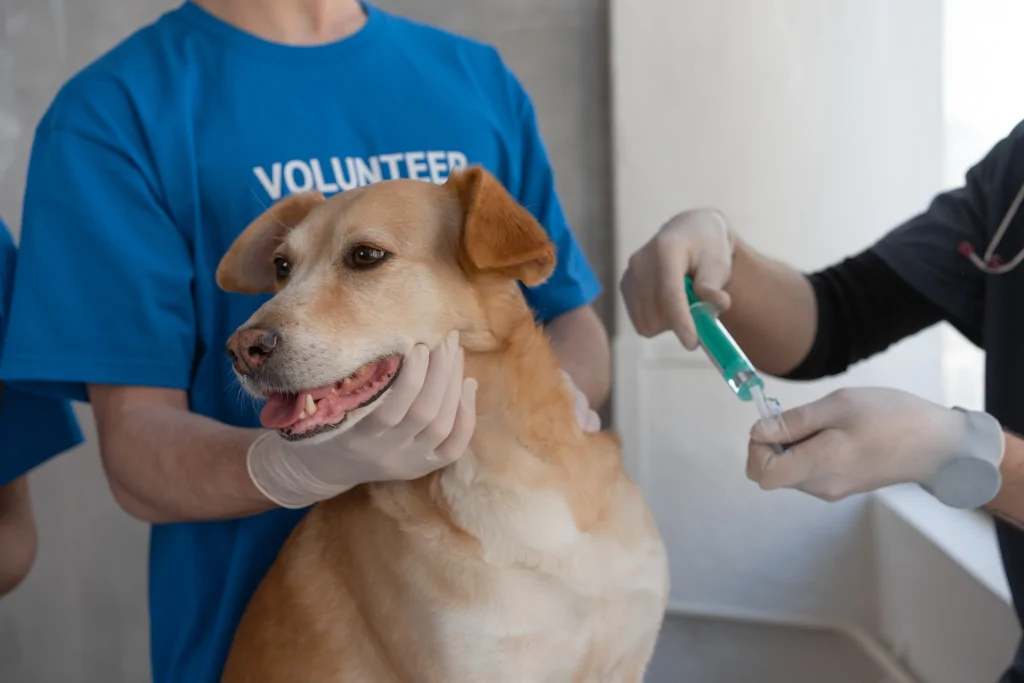Taking care of our furry friends is a top priority, and navigating the world of canine vaccinations can be overwhelming.
It’s tough to know which shots are truly essential, and the thought of needles may cause a bit of anxiety for both you and your pet.
We’re here to help you understand the importance of core vaccinations and how they can protect your canine companion from serious diseases.

Why Are Core Vaccinations Necessary?
Core vaccinations are crucial because they prevent some of the most common and dangerous diseases that can affect your dog’s health.
They serve as a shield, keeping your beloved pet safe from life-threatening illnesses that could otherwise cause suffering or even be fatal. They are essential, unlike non-core dog vaccines, which may be required depending on your dog’s lifestyle, location, and health status.
Just as we get vaccinated to protect ourselves, ensuring our dogs receive these core vaccines is a responsible and loving decision. By taking this step, you’ll have peace of mind knowing you’ve done everything possible to keep your four-legged friend healthy and happy.
So let’s dive in and discover the key vaccines your dog needs to live their best life!
Key Core Vaccines and the Diseases They Prevent
Understanding the key core vaccines and the diseases they prevent is essential for keeping your dog healthy. Let’s explore each of these critical vaccines, their importance, and how they can protect your furry friend from severe illnesses.
Distemper
Canine distemper is a highly contagious and potentially fatal virus that affects the respiratory, gastrointestinal, and nervous systems of dogs.
The distemper vaccine is crucial for protecting your pet from this severe disease.
I remember when my older dog, Sam, was just a pup, and we met another dog owner at the park whose dog had unfortunately contracted distemper. Witnessing the suffering of that dog and its owner was heart-wrenching, and it highlighted the importance of vaccinations to me.
Parvovirus
Canine parvovirus is another highly contagious viral infection that can be lethal, especially for puppies. It attacks the gastrointestinal tract, causing severe vomiting, diarrhea, and dehydration.
The parvovirus vaccine is an essential part of your dog’s core vaccination plan, ensuring their immune system is equipped to fight off this dangerous virus.
Adenovirus
Adenovirus in dogs comes in two types: type 1, which causes infectious canine hepatitis, and type 2, which leads to respiratory infections.
Both types can have severe consequences for your dog’s health, and vaccination is the best way to protect them. The adenovirus vaccine is a combination vaccine that guards against both types of the virus, keeping your dog’s liver and respiratory system healthy.
Rabies
Rabies is a fatal viral infection that affects the central nervous system and can be transmitted to humans.
This zoonotic disease is a major public health concern, and vaccination is not only crucial for your dog’s safety but also for the safety of your family and community.
The rabies vaccine is often required by law in many places, ensuring that the spread of this deadly disease is minimized.
These core vaccines play a vital role in safeguarding your dog’s health and well-being. Remember, prevention is always better than cure. By keeping your dog’s vaccinations up-to-date, you’re giving them the best chance at a happy and healthy life, just like my dear Sam and Charlie deserve.
The Vaccination Schedule Explained
A well-planned vaccination schedule is essential to keep your dog protected from harmful diseases.
By following a recommended timeline for administering core vaccines, you’ll ensure your furry friend stays healthy and enjoys a long, happy life. Let’s explore the standard vaccination schedule for dogs.
Puppies
Puppies usually receive their first round of vaccinations between 6 and 8 weeks of age. This is the beginning of a series of vaccines that will be administered every 3 to 4 weeks until they are about 16 weeks old. The initial vaccinations typically include:
- Distemper
- Parvovirus
- Adenovirus (both types)
Rabies vaccination is typically given at 12 to 16 weeks, depending on local regulations and your veterinarian’s recommendation.
Adult Dogs
For adult dogs, the frequency of booster vaccinations depends on factors such as the dog’s age, overall health, and lifestyle.
Generally, boosters for distemper, parvovirus, and adenovirus are given every 1 to 3 years, while the rabies booster is usually administered every 1 to 3 years, depending on local laws and the specific vaccine used.
Your veterinarian will help determine the best vaccination schedule for your dog, taking into account their unique needs and circumstances.
Regular check-ups with your vet will ensure that your dog remains up-to-date with their vaccinations and that any changes in their health or lifestyle are taken into consideration.
Try to follow the vaccination schedule recommended by your veterinarian closely. This not only protects your dog from serious diseases but also contributes to maintaining the overall health of the canine population in your community.
By keeping your dog’s vaccinations current, you’re doing your part to ensure a safer and healthier environment for all dogs.
The Role of Boosters in Your Dog’s Health
Over time, the protection provided by the initial vaccinations wanes, and boosters ensure your dog’s immune system remains strong and ready to fight off potential infections. That’s why boosters play a critical role in maintaining your dog’s immunity to harmful diseases.
Several factors influence the frequency of booster vaccinations, including:
- Vaccine type. Some vaccines provide longer-lasting immunity than others, requiring boosters at different intervals. For example, rabies vaccines often provide longer-lasting immunity, with boosters required every 1 to 3 years, while other vaccines, like Bordetella, may require boosters more frequently.
- Age and overall health. Puppies and senior dogs may have weaker immune systems, necessitating more frequent boosters. Additionally, dogs with certain health conditions might require a tailored booster schedule.
- Lifestyle and exposure risk. Dogs that frequently visit dog parks, and boarding facilities, or participate in dog shows may have a higher risk of exposure to diseases, warranting more frequent boosters.
- Geographic location. The prevalence of specific diseases in your area may influence the need for boosters. For instance, certain regions may have a higher risk of tick-borne diseases or leptospirosis.
For a typical indoor dog in the US, boosters for core vaccines such as distemper, parvovirus, and adenovirus are generally given every 3 years, while rabies boosters are given every 1 to 3 years, depending on the specific vaccine used and local regulations.
Staying committed to the booster schedule suggested by your veterinarian not only strengthens your beloved pet’s defenses against serious illnesses but also contributes to their overall well-being, allowing them to lead a vibrant, joyful life.
It’s essential to have open conversations with your vet about your dog’s individual needs, lifestyle, and potential risks to tailor the most suitable vaccination and booster plan, ensuring they receive the best care possible.
Be on a lookout for any vaccine reactions, take notes, and you can rest assured you did everything you could to assure your furry pup is adequately cared for.
FAQs
Alex, a passionate animal lover, has experience in training and understanding animal behavior. As a proud pet parent to two dogs and three cats, he founded AnimalReport.net to share insights from animal experts and expand his knowledge of the animal kingdom.




